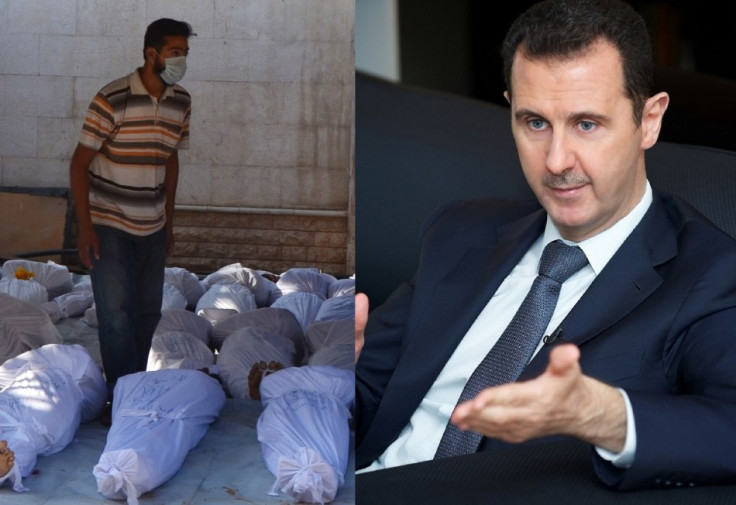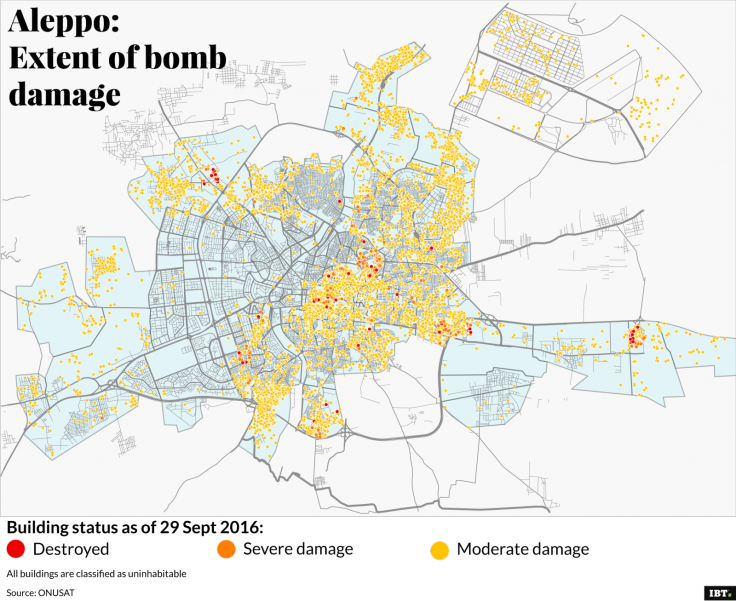Breaking Aleppo report details city's 'indiscriminate' destruction, debunking Russia's claims
The Atlantic Council analysis provides evidence for the continuous use of chemical weapons, among other attacks.
A new report aims at providing clarity over the contested events surrounding the siege of rebel-held eastern Aleppo, a key event in the six-year long Syrian conflict, providing evidence for the continuous use of chemical weapons against the civilian population, among other human rights abuses.
Collating evidence from a variety of sources, including the Russian government, the Atlantic Council report, titled "Breaking Aleppo", details the "indiscriminate" destruction of the city by the Syrian forces loyal to president Bashar al-Assad, backed by Russia and Iran.
The biggest city in Syria, Aleppo was divided into pro-Assad and anti-government sides (the west and the east respectively) in July 2012. As a major enclave of the opposition, reconquering the city became a matter of survival for Assad's regime.
As Russian foreign minister Sergey Lavrov admitted in January, Damascus was two-three weeks from falling to the rebels when Russia started backing its ally in September 2015. In the first month of Russia's bombing campaign, the UN estimated that more than 35,000 people had fled the city and 370 died in the bombing.
Aleppo's supply lines were cut in July 2016, and the rebel-held areas became completely besieged. Syrian forces eventually claimed control over the entire city on 22 December. According to the report, published on 13 February, the siege of Aleppo brought "the horrors of the 20th century's wars to the 21st century."
Numerous reports of human rights violations, including the targeting of humanitarian and healthcare workers, were disputed by Russian officials, but the evidence collected by the research suggests the airstrikes targeted hospital deliberately and repeatedly.
"Throughout the entire length of the battle for Aleppo, there have been multiple claims of violations of human rights and multiple denials," said Eliot Higgins, a senior fellow at the Atlantic Council's Digital Forensic Research Lab and the editor of the investigative news website bellingcat.com, who led the analysis of satellite images, security camera videos, social media and even footage from the government-supported Russian television network.

"What we have been able to present now is a wealth of evidence confirming the targeting of civilian structures, namely hospitals, which in certain cases has been denied by the Russian Ministry of Defence," Higgins told the New York Times. "We have been able to confirm the use in civilian areas of a variety of indiscriminate weapons."
The report focuses on four types of attacks: those against hospitals and medical facilities, and those carried out using incendiary weapons, cluster munitions and other explosive munitions, and chemical weapons.
The Forensic Architects team based at London's Goldsmiths University digitally reconstructed the September bombing of the M2 Hospital using footage from the security camera. Additional evidence of the repeated bombings, disputed by the Russian government, was provided by satellite image.
Forensic 3D reconstruction of the repeatedly bombed M2 Hospital by @ForensicArchi #BreakingAleppo Full video - https://t.co/8X8dY1Dtat pic.twitter.com/SrLnhHsxAD
— bellingcat (@bellingcat) February 13, 2017
Perhaps the most important analysis is that in relation to the use of the outlawed chemical weapons, which had become the subject of former President Barack Obama's "red line" warning to the Assad regime.
The Obama administration was often criticised for its failure to act against Assad's abuses, but defended its actions pointing to a deal brokered with Russia for Syria to destroy its chemical weapons stockpile, supposedly preventing further chemical weapons attacks on the population.
The Atlantic Council analysis of a variety of reports from victims and video on YouTube however indicates that the Syrian government kept using chlorine gas against the civilian population, particularly in the final phase of the battle for Aleppo. The report said one video "showed a chlorine gas cylinder with its labels intact."
Higgins told the New York Times, the attacks continued even after reports confirming their use were made by the United Nations and an international watchdog organisation in The Hague that enforces the ban on the use of chemical agents in war.

Introducing the report, Former US secretary of state Madeleine Albright, former Swedish prime minister Carl Bildt, Former Prime Minister and Foreign Minister of Sweden, Harvard University professor and former Under Secretary of State Nicholas Burns and Atlantic Council chairman Jon Huntsman, Jr. denounce Assad as "incompetent" and "unreliable" and hope that the analysis provided will help charter the new US administration's policy in Syria, particularly in relation to the Syrian regime and Russia.
"The regime's war in Aleppo showed that Assad was ineffective against the Islamic State
of Iraq and al-Sham (Isis) and other extremists – suggesting that the Syrian regime would be a poor if not harmful partner for the United States," they say. "The events in Aleppo documented by this report are a reminder that diplomacy without leverage is dangerous, that the new information wars waged by US adversaries demand a new counter-strategy, and that the victors in Aleppo are not our allies against terrorism."
© Copyright IBTimes 2025. All rights reserved.






















